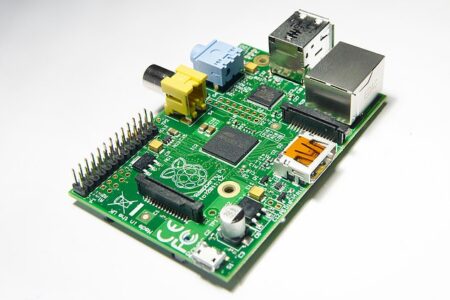Analysts have tipped Raspberry Pi to achieve FTSE 250 status in the latest shake-up of London markets, less than three months after the computer maker went public.
The Cambridge-based group’s initial public offering in June created a frenzy of investor interest, with buyers of all sizes eager to capitalise of Raspberry Pi’s growth potential.
And Raspberry Pi could already face promotion to London’s mid-cap index in a looming shake-up, which will be based on closing prices on 3 September and take effect on 23 September.

Growth potential: Raspberry Pi makes products used by enthusiasts to build computer servers or retro games consoles
Founded in 2012, Raspberry Pi makes products used by enthusiasts to build computer servers or retro games consoles.
Raspberry Pi’s IPO was highlighted by some as a rare victory for the London markets after a sustained period of struggling to attract new businesses, and suffering defections to foreign stock exchanges and private ownership.
Shares soared again a few days later when retail investors were given the opportunity to get behind the firm.
Raspberry Pi shares are currently trading at 401p, marking an increase of more than 40 per cent from their 280p IPO price.
Analysts at Panmure Liberum, Joachim Klement and Susana Cruz, think the firm, which now has a market capitalisation of £782.2million, will be promoted to the FTSE 250 next month.
They predict £397million market cap Puretech Health will be relegated out of the index, but the pair noted that ‘no stock in the FTSE Small Cap currently qualifies for automatic promotion into the FTSE 250’.
Susannah Streeter, head of money and markets at Hargreaves Lansdown, said: ‘The company’s initial aim was to provide IT that was affordable for young people to own and explore with confidence, giving them the chance to discover computing.
‘Customers are now using its single-board computers in a variety of applications across a broad range of markets, and the computers are more efficient to manufacture than legacy desktop and embedded PCs, consuming 90 per cent less electricity.
‘Raspberry Pi now manufactures computer modules for industrial clients, involved in the ‘internet of things’ sector – creating devices with sensors, processing ability, software and other technologies that connect and exchange data over the internet.
‘There is now much excitement about the technology’s potential as so called “edge computing” takes off when data is processed closer to where its created making things work more quickly.
‘However, with plenty of pretenders to its tiny throne, Raspberry Pi will have to work hard to stay near the front of the race.’
Raspberry Pi will issue a performance report for the first time on 24 September, when the group publishes its first-half results.
DIY INVESTING PLATFORMS
Affiliate links: If you take out a product This is Money may earn a commission. These deals are chosen by our editorial team, as we think they are worth highlighting. This does not affect our editorial independence.


